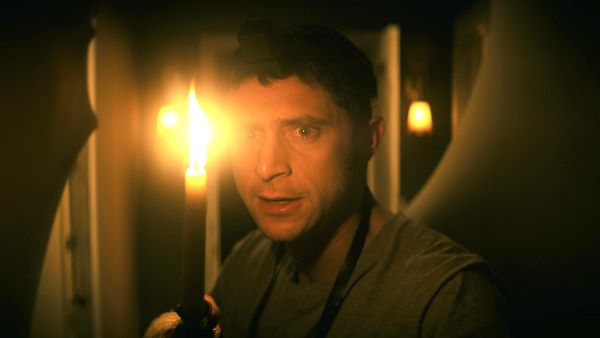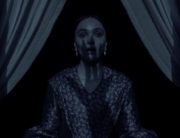
Most horror films with a religious element tend to be related to Christianity or involve the church in an endless war with demons, Exorcist-style. By comparison, it’s pretty rare to see Judaism used as the basis for horror storytelling, even though the Old Testament has its share of monstrous creations—just look at the popularity of Lilith. The Vigil offers an example of what that horror might look like, mixing the atmosphere of a haunted house flick with Judeo-centric themes of sin and forgiveness. While hardly groundbreaking, the film still effectively provokes an atmosphere of tension and scares where it counts.
The plot centers on Yakov Ronen (Dave Davis), a former Orthodox Jew now living in the outside world and dealing with the struggles of holding jobs and paying rent. A meeting with likeminded ex-Hasidic Jews hints that their past lives were incredibly sheltered but now, regardless of income-based hardships, they have the freedom to experience life without anyone looking over their shoulder.
All is well until a former community member, Reb Shulem (Menashe Lustig), approaches Yakov and asks him to be the replacement shomer—someone who recites Psalms to a deceased body as a means of warding off malevolent spirits—for a Holocaust survivor named Rubin Litvak. Despite his hesitation to reenter his religious past, and against criticisms from Litvak’s widow (Lynn Cohen, in one of her last roles), Yakov accepts the offer mainly because Shulem seems desperate and will pay him a large sum when it’s all over.
Of course, his dozing off in this kind of scenario is never a good idea. Though Shulem noted that Mr. Litvak became a recluse in his later years and cut off ties with his children, it turns out that this was more than just a byproduct of old age. What Yakov discovers, in a recording made by Litvak (Ronald Cohen), is that he and the house have long been under the grip of a Mazzik, a Hebrew demon that parasitically linked itself to Mr. Litvak since the day he was forced to perform an act of violence at Buchenwald. In addition to being within proximity of Litvak’s corpse, Yakov offers an ideal next target: doubtful, haunted by a personal tragedy, and formerly on medication to curb some mental illness symptoms. If he doesn’t find and exploit the Mazzik’s weakness by dawn, he risks becoming its new host.
We never get a full glimpse of the Mazzik’s form, despite its description as a creature cursed to watch everything with its head turned backwards. Yet the demon’s presence gradually creeps into various corners of Litvak’s apartment and somehow Yakov’s phone, leaving manipulative messages and recordings designed to taunt our hero in hopes of reviving his painful memories and feeding off them. These moments provide some rationale to why Yakov can’t just call for help or leave the house, thus excluding him from the plethora of idiotic horror protagonists who rarely think their circumstances through. A few jump-scare noises aside, debut director Keith Thomas sticks to claustrophobic tone and geography over shock value, keeping The Vigil’s plot tense despite having a familiar premise.
Just as most of The Vigil’s horror is limited to its apartment setting, so too is the drama confined to Yakov and Mrs. Litvak’s encounters with the Mazzik. One has seen its handiwork deteriorate her husband’s mind for decades, while the other is forced to reconcile with his past just as he’s in the process of moving on. Jewish culture links their fates together with the Buchenwald flashback as a stand-in for the Holocaust. Faith is thus presented as the antithesis to this cruelty, particularly when Yakov dons a certain religious item to give him the confidence to fight back in the cinematic equivalent of a Jewish “suit up” moment. While the climax feels a bit rushed here and there, it nevertheless allows most of the religious and generational themes sprinkled throughout to come full circle.
The Vigil might not be on par with Hereditary or Get Out, but it knows how to say much with very little, and for most budding directors who start out in this genre, that’s a good testing ground. After all, the main villain is a supernatural byproduct of a real-life horror scarier than anything Hollywood could ever imagine.
















Leave A Comment